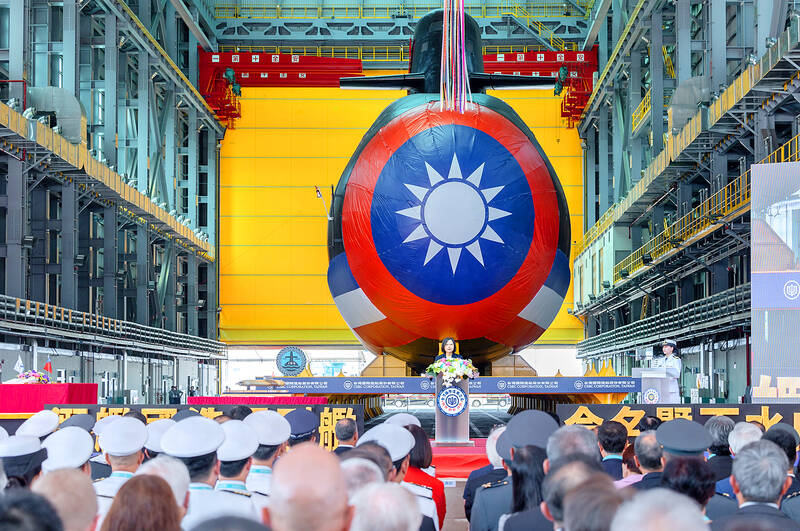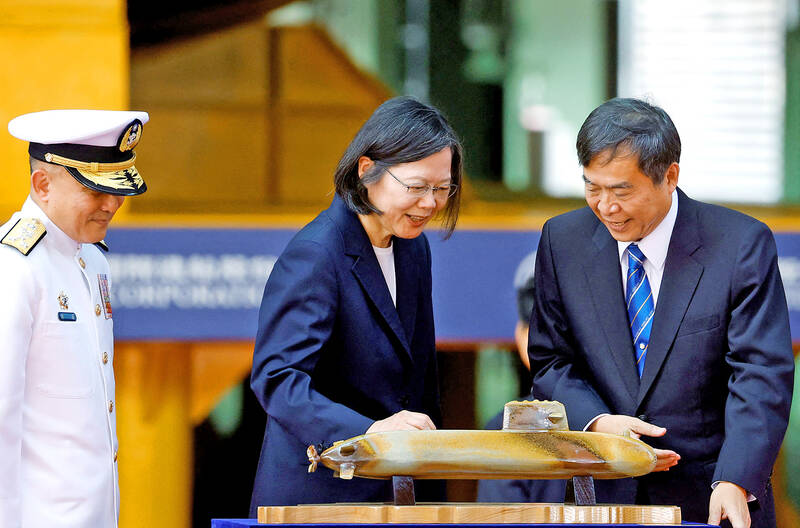President Tsai Ing-wen (蔡英文) yesterday presided over the launch of the nation’s first domestically made submarine, called Hai Kun (海鯤), or Narwhal, or at a ceremony in Kaohsiung, calling the event a crucial moment in Taiwan’s mission to produce domestic subs and achieve “defense autonomy.”
The ceremony was held at a CSBC Corp, Taiwan (台灣國際造船) shipyard, the contractor for the nation’s Indigenous Defense Submarine (IDS) project.
“Today will go down in history,” Tsai said in her remarks.

Photo: EPA-EFE / Presidential Office
Building an IDS used to be considered “mission impossible,” but it is now a reality, she added.
Saying that submarines are crucial in the navy’s efforts to develop asymmetric combat capabilities and other key strategies, Tsai hailed the occasion as a landmark in the nation’s bid to achieve “defense autonomy.”
The IDS prototype has the pennant number “711” and an X-shaped rudder, instead of a cross-shaped rudder seen on previous models, which according to CSBC Corp, Taiwan chairman Cheng Wen-lon (鄭文隆) gives it an edge over Taiwan’s other submarines in active service.

Photo: Carlos Garcia Rawlins, Reuters
Asked why the ship was named Hai Kun, Navy Command said that Taiwan was once called “Kun Island.”
Kun is the name of a “gigantic” fish in the first chapter of Zhuangzi titled “Free and easy wandering” (逍遙遊), it said.
Kun also connotes “stealth” and “hard to detect” motions, it said
The submarine would be able to move far and wide, and thus provide naval deterrence to better protect the nation, it said.
The number 711 symbolizes “cross-generation” and “superb excellence,” it added.
Also in attendance at the ceremony were IDS program convener Huang Shu-kuang (黃曙光), American Institute in Taiwan Director Sandra Oudkirk, Minister of National Defense Chiu Kuo-cheng (邱國正) and Kaohsiung Mayor Chen Chi-mai (陳其邁).
Only the bow of the submarine was exposed at the ceremony, with the torpedo tubes and other critical components covered with a national flag.
Huang on Monday said that after the launch ceremony, the IDS prototype is to undergo a harbor acceptance test on Sunday, followed by a sea acceptance test, and hopefully would be delivered to the navy before the end of next year.
The IDS program aims to build another submarine by 2027.
Both submarines are to be deployed to defend the waters around Taiwan, and the area from Suao Township (蘇澳) in Yilan County to near Yonaguni Island in Japan’s Okinawa Prefecture, Huang said.
The building of domestic submarines means Taiwan’s navy will have three combat-ready submarines by 2025 and four by 2027, including two existing Chien Lung-class (Sword Dragon) submarines bought from the Netherlands in the 1980s.
Taiwan also has two World War II-vintage subs purchased from the US in the 1970s, which are now only used for training.

CHAOS: Iranians took to the streets playing celebratory music after reports of Khamenei’s death on Saturday, while mourners also gathered in Tehran yesterday Iranian Supreme Leader Ayatollah Ali Khamenei was killed in a major attack on Iran launched by Israel and the US, throwing the future of the Islamic republic into doubt and raising the risk of regional instability. Iranian state television and the state-run IRNA news agency announced the 86-year-old’s death early yesterday. US President Donald Trump said it gave Iranians their “greatest chance” to “take back” their country. The announcements came after a joint US and Israeli aerial bombardment that targeted Iranian military and governmental sites. Trump said the “heavy and pinpoint bombing” would continue through the week or as long

TRUST: The KMT said it respected the US’ timing and considerations, and hoped it would continue to honor its commitments to helping Taiwan bolster its defenses and deterrence US President Donald Trump is delaying a multibillion-dollar arms sale to Taiwan to ensure his visit to Beijing is successful, a New York Times report said. The weapons sales package has stalled in the US Department of State, the report said, citing US officials it did not identify. The White House has told agencies not to push forward ahead of Trump’s meeting with Chinese President Xi Jinping (習近平), it said. The two last month held a phone call to discuss trade and geopolitical flashpoints ahead of the summit. Xi raised the Taiwan issue and urged the US to handle arms sales to

BIG SPENDERS: Foreign investors bought the most Taiwan equities since 2005, signaling confidence that an AI boom would continue to benefit chipmakers Taiwan Semiconductor Manufacturing Co’s (TSMC, 台積電) market capitalization swelled to US$2 trillion for the first time following a 4.25 percent rally in its American depositary receipts (ADR) overnight, putting the world’s biggest contract chipmaker sixth on the list of the world’s biggest companies by market capitalization, just behind Amazon.com Inc. The site CompaniesMarketcap.com ranked TSMC ahead of Saudi Aramco and Meta Platforms Inc. The Taiwanese company’s ADRs on Tuesday surged to US$385.75 on the New York Stock Exchange, as strong demand for artificial intelligence (AI) applications led to chip supply constraints and boost revenue growth to record-breaking levels. Each TSMC ADR represents

Pro-democracy media tycoon Jimmy Lai’s (黎智英) fraud conviction and prison sentence were yesterday overturned by a Hong Kong court, in a surprise legal decision that comes soon after Lai was jailed for 20 years on a separate national security charge. Judges Jeremy Poon (潘兆初), Anthea Pang (彭寶琴) and Derek Pang (彭偉昌) said in the judgement that they allowed the appeal from Lai, and another defendant in the case, to proceed, as a lower court judge had “erred.” “The Court of Appeal gave them leave to appeal against their conviction, allowed their appeals, quashed the convictions and set aside the sentences,” the judges